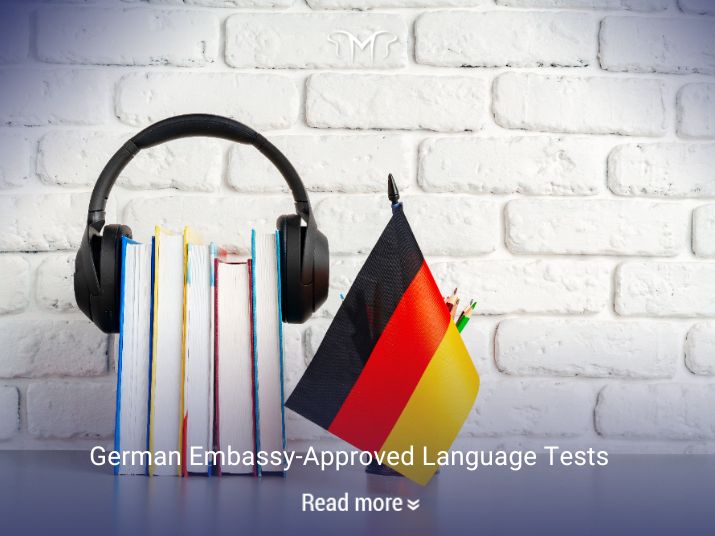
An Overview of German Embassy-Approved Language Tests
If you plan to migrate to Germany for educational or work purposes, obtaining a language certificate is one of the essential requirements. This is because most professors at German universities teach in German, and German employers prioritize individuals proficient in the language. With this in mind, taking German Embassy-approved language Tests is one of the critical steps for those seeking to immigrate to Germany. If you’re unfamiliar with these tests, don’t worry; this article provides a comprehensive guide to the German Embassy-approved language Tests in the simplest terms. Stay with us until the end!
German Embassy-Approved Language Tests
As mentioned earlier, participating in German Embassy-approved language Test is mandatory to obtain a visa and migrate to Germany. There are various tests that, upon successful completion, provide you with a language certificate recognized by the German Embassy. Below are the most important German Embassy-approved language Tests:
1. Goethe-Institut Exam
The Goethe-Institut exam assesses language skills from levels A1 to C2. It is one of the most renowned and respected certifications for academic, professional, and other types of migration. Those planning to migrate to Germany can take this test to obtain their language certificate and present it to the German Embassy. For more details, you can read our article on the Goethe German Language Exam.
2. OSD Certificate
The OSD certificate is another exam recognized by the German Embassy, assessing German language skills from levels A1 to C1. This exam is organized by the Austrian Cultural Forum (OKF) and is conducted five times annually in various countries.
3. TELC Exam
The TELC exam is another widely recognized German language test approved by the German Embassy. In Iran, it is available up to level A2 and is suitable for individuals planning to migrate to Germany.
4. DSH Exam
The DSH exam is one of the German language tests aimed at migration. It is conducted by public universities in certain countries and assesses listening, speaking, reading, and writing skills.
5. TestDaF Exam
The TestDaF exam is designed for those intending to study at German universities. It covers levels B2 to C1 and is recognized by the German Embassy.
6. TestAS
TestAS is one of the exams approved by the German Embassy, focusing on assessing the academic qualifications of foreign candidates. It is commonly used for admission to German public universities.

German Language Proficiency Levels
Like all languages, German is divided into various levels that reflect the learner's proficiency across different language skills. Here’s an explanation of these levels:
A1 Level
At this level, learners can understand and use basic phrases and sentences for everyday communication. Those with an A1 certificate can introduce themselves and ask simple questions in daily interactions.
A2 Level
Applicants who intend to take german embassy approved language tests can easily understand words and sentences related to specific topics such as introducing themselves, family, shopping, work, surroundings, etc., by obtaining an A2 level German language certificate, and can express themselves correctly in common and simple situations.
B1 Level
At this level, candidates can discuss familiar topics clearly and understand the main points of standard conversations. They can also manage most situations encountered during travel to Germany and discuss their interests using simple, continuous sentences.
B2 Level
Applicants who take the tests approved by the German Embassy and reach level B2 have the ability to understand the main points of difficult texts on various issues and to follow and study specialized topics and materials in their field of expertise. For example, they can attend a class in German and understand the topic of the class discussion. They also have the ability to speak fluently and continuously with native speakers of German without prior preparation; without any problems or ambiguities for either party. This is usually the level accepted for immigration of nurses to Germany.
C1 Level
Those at the C1 level can understand long, advanced texts and speak fluently without preparation. This level is often required for professional and academic purposes, such as nursing or studying in Germany.
C2 Level
At the C2 level, individuals can understand and process spoken or written material effortlessly. They can synthesize information from multiple sources and provide detailed explanations or arguments, demonstrating complete fluency in the language.
By understanding the requirements and available embassy-approved language tests, you can take the next step toward your goal of living, working, or studying in Germany.

The Required Language Level for Immigration to Germany
Some individuals express concerns about the challenges of learning German, especially for nurses. However, the language proficiency level required for immigration to Germany varies depending on the type of visa. Generally, if you possess a language certificate above level B2, you can apply for various German visas without worrying about rejection or insufficient language skills. Below, we review the approved language certificates and levels recognized by the German embassy for different immigration purposes:
Work Immigration
Individuals taking embassy-approved language tests for work immigration must achieve at least level B2. However, in some cases, B1 may suffice for certain professions.
Study Immigration
The minimum German language level for a student visa is B1.
Marriage-Based Visa
For immigration through marriage, applicants must provide a certificate at level A1.
Costs of Embassy-Approved Language Tests
The cost of German language exams depends on the type of test and the level desired. Below are the costs for some embassy-approved tests:
Goethe Exam
The cost of the different levels and sections of the test varies. Typically, the entry-level German language tests for visas are cheaper, starting at 135 euros for level A1. So each level of the Goethe test also has its own unique cost. Here are the costs for each level of the Goethe test:
| Registration fee | Language level |
| 135 | A1 |
| 155 | A2 |
| 255 | B1 |
| 285 | B2 |
| 299 | C1 |
| 355 | C2 |
OSD Exam
The OSD registration fee depends on the level and the administering center, starting at €95 for beginner levels.
| Registration fee | Language level |
| 95 | A1 |
| 104 | A2 |
| 120 | B1 |
| 138 | B2 |
| 158 | C1 |
Telc Exam
The Telc exam, another embassy-approved test, is conducted in Iran by the National Organization for Educational Testing. Each level has its specific fee structure.
| Registration fee | Language level |
| 139 | A1 |
| 159 | B1 |
| 159 | B2 |
| 169 | C1 |
TestDaF Exam
The TestDaF exam, available in multiple countries, is conducted six times a year in paper-based or computerized formats. The registration fee is approximately €145.

Validity Period of Embassy-Approved Tests
The validity of embassy-approved language certificates varies as follows:
-
Goethe Exam: Lifetime validity, but some universities and employers may not accept certificates older than two years.
-
TELC Exam: Lifetime validity.
-
OSD Exam: Valid for three years, with a possible three-year extension.
-
TestDaF: Lifetime validity.
-
ECL Exam: Lifetime validity.
-
DTZ Exam: Valid for three years.
-
DSH Exam: Valid for two years.
Generally, most embassy-approved German language tests have lifetime validity unless specific institutions require a renewal.
Best Methods to Improve German Language Skills
Enhance your German language proficiency with these effective methods to improve listening, speaking, reading, and writing skills:
-
Listening to Podcasts and Music:
Engage with German-language podcasts and music to familiarize yourself with vocabulary, sentence structures, and correct pronunciation. -
Watching Movies and Series:
Watching German films and TV shows with subtitles is an entertaining way to learn and improve listening and speaking skills. -
Reading Books:
Reading German storybooks and educational materials boosts vocabulary and grammar knowledge, helping you understand sentence structures. -
Changing Device Settings to German:
Switching your phone and computer to German increases daily interaction with the language and helps learn new words. -
Practicing Conversations with Others:
Speaking with native speakers or fellow learners strengthens speaking skills. Social media platforms can help connect with German-speaking friends. -
Listening to Audiobooks:
Audiobooks are another excellent way to improve pronunciation and comprehension skills. -
Daily Writing Practice:
Keeping a journal or blog in German enhances writing skills and helps familiarize you with grammar and syntax. -
Consistent Practice
Dedicate at least four hours daily to learning German, focusing on reading, writing, and speaking.
With regular practice and a structured learning plan, you can gradually improve your German skills and successfully pass embassy-approved tests.
Language Exams: The Key to German Immigration
German language exams are essential tools for assessing proficiency levels across various categories. They serve as a gateway for educational and professional opportunities in Germany. This article by Monarch Migration Holding aimed to provide a comprehensive overview of embassy-approved tests and share tips for improving German proficiency. Monarch specializes in helping healthcare professionals immigrate to Germany. If you meet the language requirements and wish to move to Germany, contact Monarch for free services and expert assistance.
FAQs
1. What are some embassy-approved German language tests for immigration?
Goethe, OSD, TELC, TestDaF, DSH, and others are recognized by the German embassy.
2. What are the different German language levels?
A1, A2, B1, B2, C1, and C2 are the levels of German proficiency.
3. What are effective methods to improve German language skills?
Listening to podcasts, music, and audiobooks; reading German books; watching German films; practicing conversations; and consistent daily study are some effective methods.


